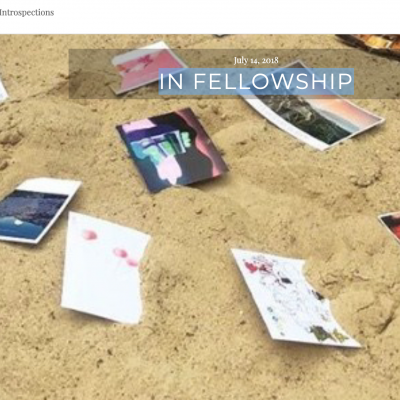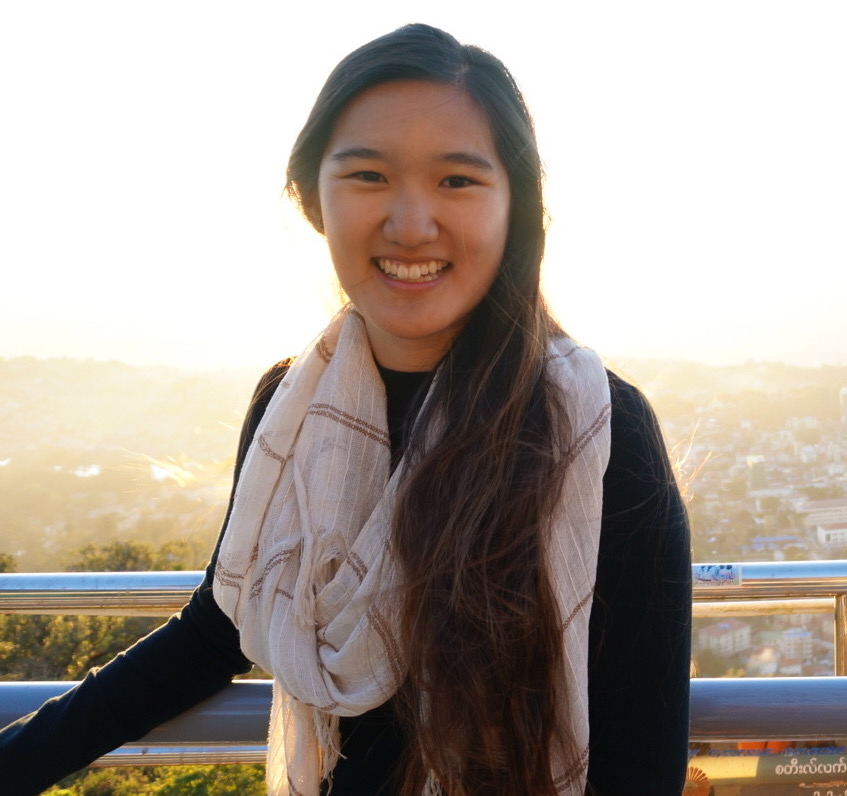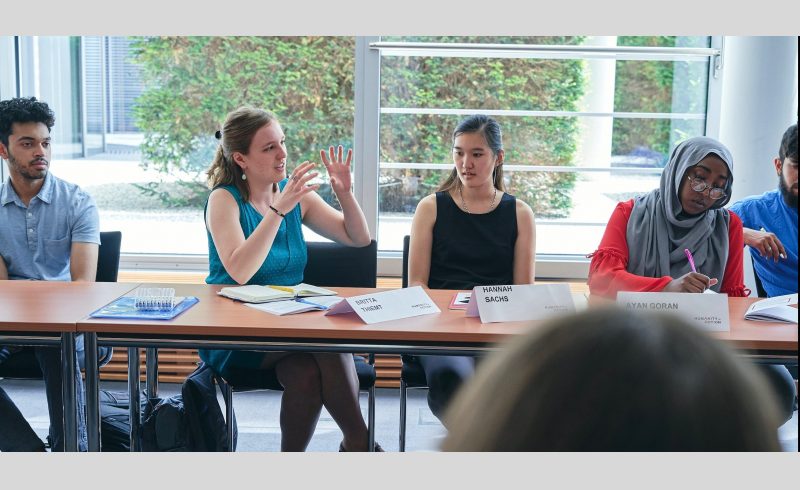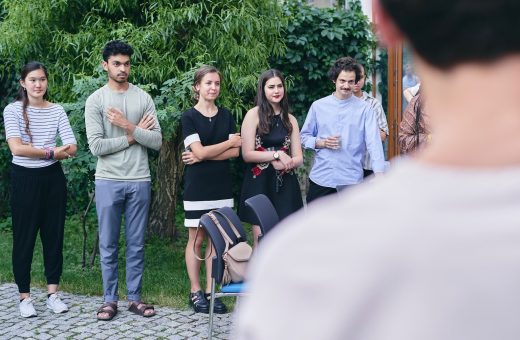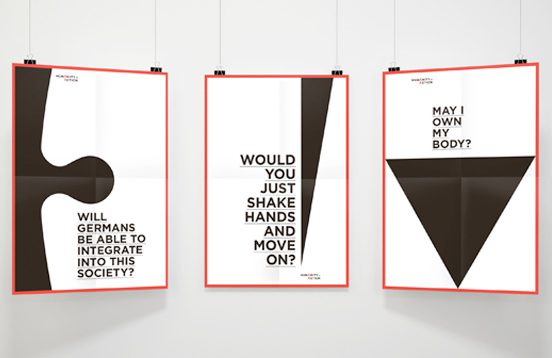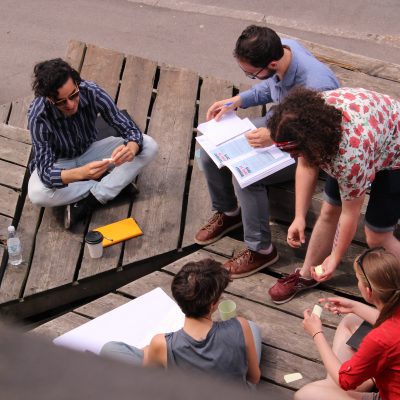Details
Article
In her personal blog, Humanity in Action Senior Fellow Hannah Sachs shares a personal reflection about her experience with Humanity in Action and being in community with her cohort of Fellows in the 2018 Berlin Fellowship Program. Hannah gave us permission to share her reflections on the Berlin Fellowship program here:
“Brava, Hannah!” Sometimes, all it takes is one burst of verbal encouragement, one comforting hand brushing your shoulder, one smile and mimed heart from across the room. And you feel whole again.
This past month, I participated in an incredible fellowship. Based in Berlin, it convened 22 young adults officially representing five countries, though more ethnic backgrounds and nationalities were present in reality. Our life experiences were broad; our passions varied; our visions for social justice diverse. Yet somehow, as a group, we meshed.
If you know me, you know I am not one to gush. I often hold my cards so close to my chest, even my most cherished friends sometimes think I am guarded.
Last night, I caught up with a dear friend from undergrad. She commented that she has never heard me talk about an experience the way that I was describing this fellowship and the impact it had on me. She said I gushed. Through her eyes, I saw how this group gave me a sense of confidence I thought I lost; a sense of hope and energy I did not know existed; a rare sense of belonging within a community I know I must cherish.
I’ve been back in the “real world”, the Fellowship bubble burst, for a week now. Over the past seven days, I’ve reconnected with graduate school friends, explored two new cities, and started a new summer school experience with 40+ new faces. I knew I had to, figuratively speaking, put pen to paper before the freshness of Humanity in Action began to fade. Here goes.
I have always struggled with identity and belonging. So often, I tiptoe through this world as if it is a tightrope; sway too far one way and I feel invisible but sway too far the other direction and I feel tokenized and exposed. As a child, I tried so hard to fit into the pre-cut shapes prescribed to me without realizing that I could create my own contours and still be part of the larger puzzle. I worked so hard to simultaneously blend in while still remaining visible. Because I always feared being forgotten.
With Humanity in Action, I started off quiet, reserved, and hesitant. One fellow shared that she thought I would be more of the silent type–the one who didn’t contribute verbally but you always wished would speak up. I get this assumption from others a lot, and I understand why, as I have reflected a lot about my demeanor, mannerisms, and what constitutes my comfort zone in new settings. I entered the fellowship feeling uncertain about how I would interact with others; I had no expectations about what the fellowship would entail and after last year, I did not know how vulnerable I wanted to be. If you know me, you know that in my most recent position, I constantly had to defend myself; my identity; my presence and legitimacy within my professional organization. Countless times, others insinuated that I was too X or not enough Y or a bit too Z to be credible or qualified for my job. After a full academic year of feeling beaten down, invalidated, and insecure about abilities I once believed in, I finally felt seen. Heard. Appreciated. Somehow, my fellow fellows empowered me to share my story and my insights, no apologies or prefaces necessary.
Hmm. Humanity in Action. What a bold claim, really. Perhaps when you hear these words, you think of grand projects; systemic social change; widespread human rights campaigns. This is all true, as senior fellows have created truly inspiring and impactful initiatives. But this past month has shown me that Humanity in Action means active empathy, support, and as the organization’s founder asserts: collaboration–not competition.
It means cheering loudly before each fellow perspective presentation, as in that moment, support is quantified by how quickly the group can replace a fellow’s nervousness with a smile that spans their entire face. It means asking how someone is doing that morning, and not being satisfied with a cursory “I’m fine”. It means during tea breaks, offering a reassuring hug to someone who had a rough morning or placing a comforting hand on someone’s shoulder as an informal, “I’m here if you need”. It means sending a WhatsApp message late at night to check in with a fellow who had a particularly emotional day. It means surprising and celebrating one another on our birthdays not because we were obliged but because we wanted to do so. It means fostering a space where you can let your guard down and be, unapologetically, yourself. It means creating a space where we can each lean into discomfort but know that we will be caught if we begin to tumble, no matter what. Truly, it is difficult to communicate adequately the depth, intensity, and gratification of this past month. “Life changing” sounds cliché. “Unique” too blasé. Our program coordinator, during our closing circle, suggested we each share a memory that encompassed our HIA experience or a moment that we would like to reflect on for years to come. With a few examples, I shall attempt to verbalize the power of my HIA experience.
For several years, I have been very open about my adoption story; how adoption shapes my identity and lens on the world; and the ways in which I have struggled at least in part because of my upbringing as a transracial transnational adoptee. I have mentored younger girls adopted from China. I have researched the topic extensively, interviewing over 30 members of our Chinese American adoptive community. I have visited my orphanage in China and left my comfort zone by returning to China again and again, though I cannot think of a place in which I feel more alien and clumsy than my country of origin.
That said, sharing my story, particularly its rudimentary details, has become comfortable. I can often anticipate the pattern of questions others will ask. There is an unofficial script I often follow; defense mechanisms in place if one’s questions become too judgmental, racist, or crass; and conversation-enders I can rely on in case I am just not in the mood. Speaking about adoption no longer makes me nervous but often, it does not excite me.
It was different within the Humanity in Action context.
For once, I felt that I was sharing a dynamic part of me that people were truly interested in and yet my adoption did not define who I was or the niche I filled within a group. The questions delved beyond surface-level facts and implored how I truly felt.
My peers were considerate, asking if I was okay with sharing rather than assuming it was their right to know. They continually wondered aloud how they could support me as I reflected on the more painful parts of the past.
Three days into the fellowship, after a day-long workshop on identity and diversity, I took the U-Bahn home with a fellow from Greece. Earlier that day, they had epitomized bravery when they renamed themselves, thus rejecting the given name that didn’t embody their identity. They shared that in the past, their chosen name and the reason behind it have been ridiculed. But they still took a risk–not knowing how we would react–and asked that we respect their authentic identity through this new name. That evening, we had the first of many heart-to-heart conversations about our identities as minoritized individuals, our struggles to embrace our true selves, and our childhood communities that we both loved yet by which we felt confined. We then started discussing human rights, terminology, and the importance of context. And finally, we landed on my adoption story. Their questions to me were genuine, nuanced, and mindful. It was the first time I felt that I opened up during the program and I was grateful that someone pushed me to do so. This individual did not make me want to retreat or raise any defense mechanisms but rather made me eager to share. I see this as the foundation upon which I was able to build confidence, trust, and community.
We all had to present a fellow’s perspective sometime during the program. I was leaning away from centering mine on adoption, as I did not want my “adoptee status” to define who I was within the program like it had in so many other communities.
But with encouragement from this newfound friend and subsequently others, I decided to focus my presentation on Chinese-to-USA transracial adoption from a personal point of view, thus challenging myself to really reflect and unpack my experiences–something I had not done thoroughly in over a year.
My fellow perspective was a transformative moment for me. I wove a brief history of adoption in the States and the One Child Policy’s implications in China with personal narrative. I shared photos from my childhood and anecdotes about my insecurities, struggles, and personal growth and triumphs. I talked about mental health challenges that adoptees often face and the ways in which I internalized racism and questioned my identity at different stages of my childhood. While I have never been a confident public speaker, my voice did not waver. And that’s a testament to the audience who received me with grace, love and support, and compassion. One fellow remarked at the end of the program that she was grateful to our cohort because we empathized without taking pity or subsequently walking on eggshells around a person after they share their story. This, I believe, epitomizes my experience as well. I was not “adopted Hannah” but “Hannah, whose adoption is among the many things that shaped her experiences and identity”. And when I concluded my presentation, the resounding “Brava Hannah”, coupled with a few sniffles and tear-filled eyes, gave me the validation and support I had been missing. The subsequent questions about adoption and the ensuing conversation over lunch showed me that people were genuinely interested in what I shared. They cared about me and who I was at my core. I did not feel self-conscious or that in sharing my emotions, I was burdening others. It was rejuvenating.
During our final night together, our group sat under the moonlight by the canal. We shared laughter, tears, and memories from the past month, though in truth it felt we had enough for a lifetime. We also began saying one-on-one farewells, or as a German fellow adamantly clarified, “not goodbyes–only see you later’s”. One fellow told me, “I really love you; you’re brave and strong.” She continued to thank me for being open about my identity and the processes I’ve been through, traumas and all. This coming from a person I admire deeply; a survivor who has every right to be angry but instead has a light and a laugh that can only be described as contagious and all-encompassing. I was–and still am–touched. It proved to me the age old phrase: with risk comes reward. With vulnerability comes strength, and the opportunity to empower another, sometimes in ways you would least expect. After a year of feeling broken, demoralized, and weighed down I finally felt whole, supported, and uplifted. In previous communities, so often I would opt out of additional or voluntary activities; with this fellowship, I consistently began to opt in. For the first time in a while, I felt that I belonged; the true me was visible; and I was comfortable sharing my many layers, unabashed.
This is not to say our group was without conflict. When you have a group of people fiercely passionate about human rights and bound to their convictions, there will likely be tension at times. We had several instances in which we had to reflect critically how we want to “show up” for, acknowledge, and try to ease others’ pain. We sometimes debated how we should express ourselves, and mused whether we were focusing on a person’s message or the tone in which it was delivered.
While it is impossible to heal all wounds or rewind time, I believe that our discussions on group dynamics illustrated our resilience and desire to improve as individuals and as a collective. We admitted our blind spots, our biases, insecurities, and uncertainties. We faced challenges rather than shied away from them, which would have been the easier route.
We didn’t always get things “right” the first time. I regret any pain I unintentionally caused others, and know that some of my peers were deeply hurt or uncomfortable for a variety of reasons throughout the program. But to me, the beauty of my Humanity in Action experience was that we, in general, truly tried to comfort, support, and affirm others’ experiences–particularly the traumatic, harrowing ones that our identities shield us from encountering firsthand. I gained experience advocating for myself while also being sensitive about others’ approaches to conflict and discomfort; I practiced staying true to my convictions while also permitting myself to forgive, challenge and unpack my instincts and reactions, and wrestle with ambiguities. In other communities, similar conflicts have broken a group–I’ve witnessed this firsthand as both a participant and program leader. In ours, while our collective identity was altered and our individual comfort zones stretched or even breached, we survived and, I believe, grew closer because of those moments.
Humanity in Action was a lesson of love; self-care; perseverance; communication; and self-awareness. As one fellow put it, we call each other out with empathy so that we can call each other back in. In some ways, partaking in HIA made the “real world” feel suspended in time; distant; unaddressed. Simultaneously, though, the learning we did reinforced the importance of connecting our conversations and lessons with reality outside our bubble.
A final anecdote: One Sunday morning, I sat on a balcony overlooking a quieter part of Berlin with a fellow I’d grown close to around the midpoint of the program. Someone who showed me that hospitality is genuine, not just empty words as I’d grown accustomed to in the States. I think we bonded over being introverts, our love for travel, and our uncertainties over our respective futures. He’s someone with whom silence is comfortable–a rare quality, I have discovered. The birds were chirping, the sun was emerging, and only occasional car engines or children’s laughter filtered through the trees–a stark contrast to the night before, when our group had been at a club in the heart of the city. Somehow, we got to talking about life, responsibilities and obligations, and associated guilt or pressure to be certain versions of ourselves or uphold specific norms. I shared some inner conflict I have been sifting through and, at times, avoiding. He posed a challenge to me: “Sometimes, you need to put yourself first. Do what brings happiness to you, not what you think is best for others.”
I’ve heard iterations of this advice throughout my life but this time it felt like an epiphany. Perhaps the weeks of intense dialogue prepared me. Or perhaps the sun shining on me somehow opened my mind and my heart to this advice. But he was right. I know I will see this moment as a turning point for years to come–the moment I realized that choosing Humanity in Action was an experience I did purely for me, even when I knew others wished I had prioritized something else.
I almost backed out of this fellowship several times because of other uncertainties, disappointments in my professional life, and my desire to return to the familiar support network I had grown in Asia the past six summers. As I started packing my suitcase for Berlin and apartment on Long Island simultaneously, the day after I officially resigned from my job, I wondered: should I just stay in New York, in the safety net of my parents, my childhood friends, and the network I just began to build? It was tempting. But, albeit subconsciously, I knew that not participating in HIA would become a regret down the line. I didn’t want the opportunity to become a “what if” or an “I should have”. As an indecisive person who debates an array of choices to the point of paralysis, I’m always told, “Just go with your gut.” And you know what? I should listen to my gut more often. Because participating in HIA–and most importantly, meeting so many incredible, dynamic, intelligent forces of nature–has re-energized me, refined the way in which I view the world, and reminded me that self-critique is necessary and even cathartic, as long as there is no absence of love for oneself, too.
To my Humanity in Action Family (Berlin 2018): Thank you. Thank you for being you. If you made it through this entire, rambling post, thank you more still! In all seriousness, though, I honestly cannot imagine our cohort without every single one of you, your unique talents, your unbridled spirits, your endless compassion, your illuminated souls. Being in fellowship with you has given me more gifts than I could ask for or even imagined; I hope that I contributed even half as much to your experiences as you did to mine. “Fellowship” often has a religious connotation; while our program was secular, for me, this fellowship was an intense spiritual journey. For someone who hates goodbyes and fears abandonment but has become really good at detached farewells, you’ve made this one particularly emotional and difficult. Which just means that my love for you and the community we created, my kindred spirits, is paramount.
References
Find the original version of this article on Hannah’s blog.

